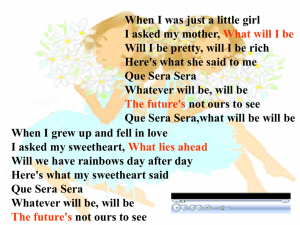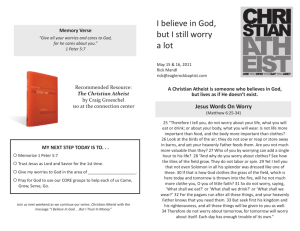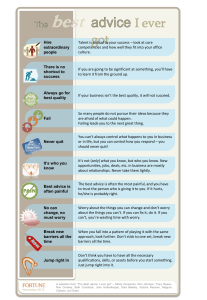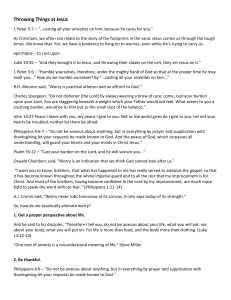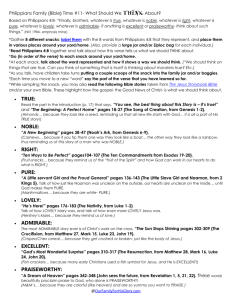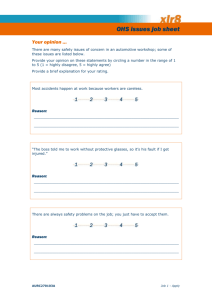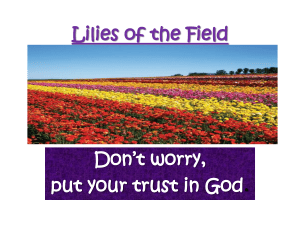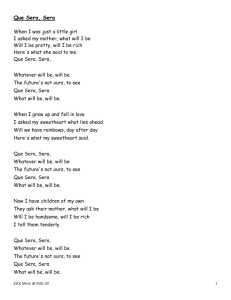Old School Can Still Be Cool - Que Sera Sera
advertisement
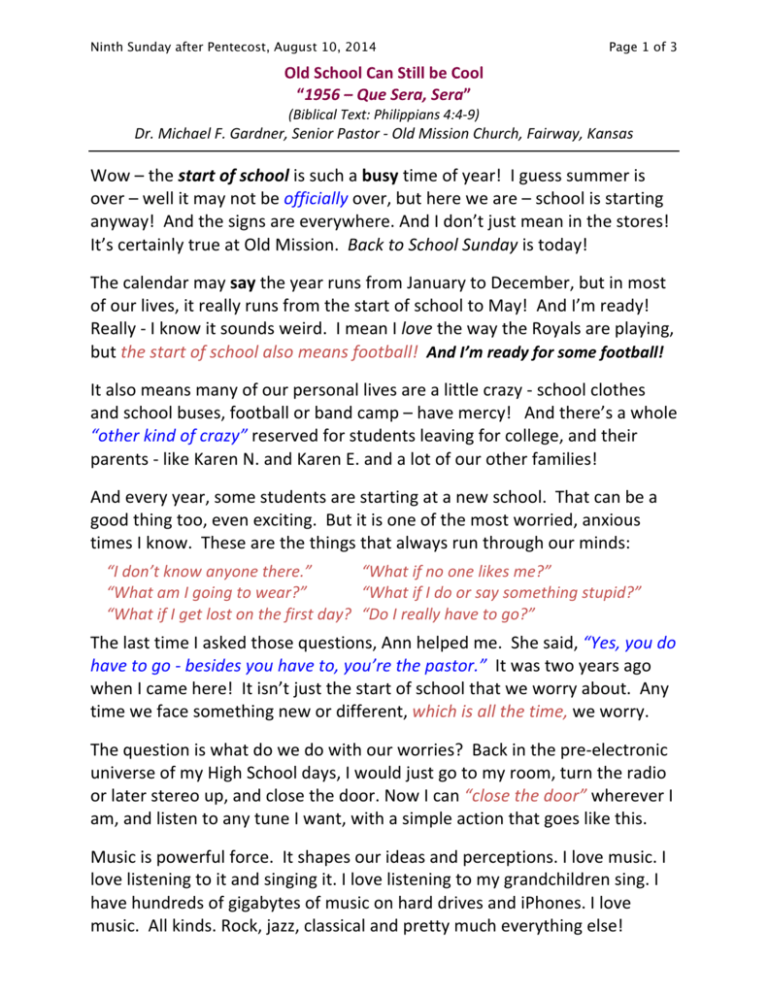
Page 1 of 3 Ninth Sunday after Pentecost, August 10, 2014 Old School Can Still be Cool “1956 – Que Sera, Sera” (Biblical Text: Philippians 4:4-­‐9) Dr. Michael F. Gardner, Senior Pastor -­‐ Old Mission Church, Fairway, Kansas Wow – the start of school is such a busy time of year! I guess summer is over – well it may not be officially over, but here we are – school is starting anyway! And the signs are everywhere. And I don’t just mean in the stores! It’s certainly true at Old Mission. Back to School Sunday is today! The calendar may say the year runs from January to December, but in most of our lives, it really runs from the start of school to May! And I’m ready! Really -­‐ I know it sounds weird. I mean I love the way the Royals are playing, but the start of school also means football! And I’m ready for some football! It also means many of our personal lives are a little crazy -­‐ school clothes and school buses, football or band camp – have mercy! And there’s a whole “other kind of crazy” reserved for students leaving for college, and their parents -­‐ like Karen N. and Karen E. and a lot of our other families! And every year, some students are starting at a new school. That can be a good thing too, even exciting. But it is one of the most worried, anxious times I know. These are the things that always run through our minds: “I don’t know anyone there.” “What if no one likes me?” “What am I going to wear?” “What if I do or say something stupid?” “What if I get lost on the first day? “Do I really have to go?” The last time I asked those questions, Ann helped me. She said, “Yes, you do have to go -­‐ besides you have to, you’re the pastor.” It was two years ago when I came here! It isn’t just the start of school that we worry about. Any time we face something new or different, which is all the time, we worry. The question is what do we do with our worries? Back in the pre-­‐electronic universe of my High School days, I would just go to my room, turn the radio or later stereo up, and close the door. Now I can “close the door” wherever I am, and listen to any tune I want, with a simple action that goes like this. Music is powerful force. It shapes our ideas and perceptions. I love music. I love listening to it and singing it. I love listening to my grandchildren sing. I have hundreds of gigabytes of music on hard drives and iPhones. I love music. All kinds. Rock, jazz, classical and pretty much everything else! Ninth Sunday after Pentecost, August 10, 2014 Page 2 of 3 I grew up in a musical family. And I still remember what my mother said before my first worry-­‐filled day at Westport High School so many years ago. She sang an old Doris Day song to me. (Some of you are old enough to know it.) The chorus goes this way: “Que sera, sera; whatever will be, will be. The future’s not ours to see. Que sera, sera.” It was not my generation’s music. But it was hers. Turns out it was wildly popular. It topped the charts in 1966 and earned an Academy Award for best song, from the movie “The Man Who Knew Too Much.” Old School. And the song asks one of the most fundamental questions of our lives. “Where do we find hope?” And it does so simply and concretely, in a way that even a child might ask it—not as a philosophical question, but as a practical one. Can I get over my worries, and trust that it will be OK? And that’s a universal question as old as human history and still fresh today. What is universal about the way we respond to this question about hope, is this. We invest in what we believe in. We live toward what we believe in. So our thoughts, words, and deeds reveal in what we trust, in what we hope. “Que sera sera, what ever will be, will be.” On one level, it sounds sort of like giving up, doesn’t it? It sounds like, “Well, we have no control so we may as well just float along with the tide.” That is one way to see it. But to me that sounds like a lack of hope, a fatalistic vision. And that’s not the only option. As a people of faith we are, maybe most of all, a people of hope. We also know that we are not in charge, God is! I think that’s the true message of the song. It also is what Paul was getting at in our text from Philippians 4. Look at verses four and five: “Rejoice in the Lord always; again I will say, Rejoice. Let your gentleness be known to everyone. The Lord is near.” There is no worry or anxiety or circumstance we will face – even the start of school – when God is not with us! And he continues to address this directly. Look at verses six to seven. “Do not worry about anything, but in everything by prayer and supplication with thanksgiving let your (needs) be made known to God. And the peace of God… …will guard your hearts and minds.”1 We have to decide where we look, and in whom we trust. We can trust in God. 1 Philippians 4:4–7. The Holy Bible: New Revised Standard Version. Copyright © 1989, Nashville: Thomas Nelson Publishers. Ninth Sunday after Pentecost, August 10, 2014 Page 3 of 3 As Jesus said, in Matthew 6:25: “Therefore I tell you, do not worry about your life, what you will eat or what you will drink, or about your body, what you will wear. Is not life more than food, and the body more than clothing?” 2 Faith isn’t easy. Choices never are. Worry and faith are alike in this. They both relate to the future, to the unseen, the unknown. The difference between them is where each is aimed. Worry aims inward and feeds on our fears, pressing on our soul so tightly that we can find it hard to breathe. Faith, on the other hand, aims outward and feeds on the promises of God, opening us up to a hope and a future! And it doesn’t even take that much. According to Jesus, a mustard seed’s worth will move a mountain. So today, I want to invite you to think of how little it might take to move you past a life of worry to a better place. Because with faith it’s not the amount that matters, but where it is aimed – toward our worries or toward God. I think God asks us to turn loose of our presumptions of control, that we turn loose of our worry and fear and focus on the promises of God. Look at the final words in our text. They are about what we fill our minds and hearts with each day. Consider verse eight. “Finally, beloved…” I love that he calls us beloved, for that’s what we are in the sight of God! “Finally, beloved, whatever is true, whatever is honorable, whatever is just, whatever is pure, whatever is pleasing, whatever is commendable, if there is any excellence and if there is anything worthy of praise, think about these things.” 3 Think on these things! Therefore at the risk of sounding overly simplistic, or as smart as a third-­‐ grader, or at the risk of sounding like Jesus, whatever you are facing today or tomorrow, I tell you this. Don’t worry about it. Have a little faith. Trust in God. God knows what you need and he cares that you make it through! Trust in him. Or in the words of Paul in our Bible text today: “Keep on doing the things that you have learned and received and heard and seen in me, and the God of peace will be with you.” 4 He will. I promise. 2 Ibid. Matthew 6:25. The Holy Bible: New Revised Standard Version. Ibid. Philippians 4:8. The Holy Bible: New Revised Standard Version. 4 Ibid. Philippians 4:9. The Holy Bible: New Revised Standard Version. 3
